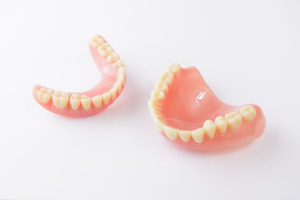
When people get dentures, they’re often astonished by just how realistic they really are. Modern prosthetics are meticulously designed to fit your mouth perfectly, making them so beautiful and comfortable that patients sometimes don’t want to take them off!
If that sounds like you, you might wonder whether it’s possible to clean your dentures without actually taking them out, brushing them like you would your normal teeth. Here’s what you should know about that prospect.
Can I Brush My Dentures While They’re Still in my Mouth?
It’s certainly possible to brush your dentures while they’re still in your mouth, and while it probably won’t hurt, this alone isn’t enough to fully clean your prosthetic. Bacteria can still accumulate underneath your dentures and on your gums, which means that you’ll have to take them off to fully eliminate any potential plaque deposits.
If you only ever brush your dentures while they’re in your mouth, you might wind up dealing with serious gum disease.
How Do I Fully Clean My Dentures?
If you want to make sure that your prosthetic is completely sanitary, there are a few more steps you need to take than simply brushing them like normal teeth. Here are a few tips you might want to keep in mind:
- Daily Cleaning: Clean your dentures daily using a soft-bristled toothbrush or a denture brush. Use a non-abrasive denture cleaner, avoiding regular toothpaste as it can be too abrasive.
- Rinsing: Rinse your dentures after eating to remove food particles. It’s also a good idea to rinse your mouth with water before reinserting your dentures.
- Overnight Soaking: Soak your dentures overnight in a denture solution to keep them moist and maintain their shape. Ensure the solution is fresh and recommended for your type of dentures.
- Regular Check-ups: Visit your dentist regularly for check-ups and professional cleaning. They can check for any issues and ensure your dentures fit properly.
- Oral Hygiene: Maintain good oral hygiene by brushing your gums, tongue, and remaining teeth (if any) to prevent infection and bad breath.
So long as you adhere to these standards, you can expect your prosthetics to stay healthy for as long as possible.
About the Author
Dr. Durga Buchupally has always wanted a job where she gets to work with her hands, and getting to craft prosthetics that can help patients who are missing teeth is an amazing way to put her artistic eye to use for others. Dr. Buchupally received her dental degree from the University of Oklahoma College of Dentistry. She is an active member of both the American Dental Association and the Texas Dental Association.
If you have any questions about dentures, we can be reached at our website or by phone at (817) 464-8655.
